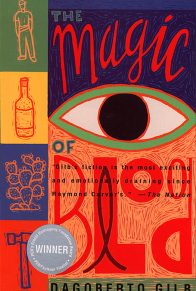Lists are life.
Katsuyuki Ito writes forty-two years in shorthand.
Always the same, few numbers change (perhaps one less tuna, a few more flounder, rice OK that day).
Folds an envelope from the Con Ed phone bill squarely across his soft middle. Tracks down a pen in the cash register (bing!). It bleeds ink. He wipes it with a tissue and itemizes. Jots his needs for tomorrow in the restaurant, in summation. A list of dead things wrenched from the ocean floor, arriving daily in their iced beds.
His needs.
Mr. Ito being a master of the chiseled shape, shokunin.
To you and me: some sushi chef.
The list is a scratchy thing, to see it. Symbols.
He stops writing, uses the metallic end piece as a makeshift toothpick and stares out the window to the street, people in their business clothes shuffling by in the jaundiced afternoon light.
Cold outside. Still.
Gorrud owsigh. Stirru.
He says this out loud, in English. To practice the sounds, like an actor.
Another need, to have something to say to customers. To chat.
To the junior marketing exec in the crinkled gray suit with fake orange nails that jut oddly curved and glossed from her hands, who mumbles hello, hello, the usual, please, meaning two California rolls and a glass of iced white zinfandel, he’ll say Gorrud owsigh stirru, she’ll smile and say tell me about it, to the trio of men from the office down the street, who blast in carrying a pocket of wind from outside, reeking of spices and metal, each sporting thick gold bands on their hairy knuckles, slamming the glass top of the sushi bar in happy-houred raucousness how ya doing, Ito! Ito!
Gorrud owsigh. Stirru.
Damn straight! Cold as a bitch. Laughter served up like a brisk, cold wave.
Loneliness is another matter. He doesn’t expect miracles.
Speaking, it’s the staccato chunks of a toddler. Hello, good-bye, yes, thank you, please, oh, good. But in there, deep down, where nobody goes but him, his head bobs with Basho haiku and The Tale of Genji, with all the moon-viewing, all the willow-leaves, all the autumn dusks snagged with the tidbits of his trade. How he judges tuna for its fat content with a flashlight in the dawn fish market alongside the haiku image on a barren branch. All thoughts whirling like flimsy scales flashing in a sink’s wetness, yet they get sieved along the way. Somewhere there’s a set of orange cones, an embargo. He pauses, his face reddens. His thoughts jettison to his tongue as babble, and he is treated as such, he is talked to as if he is a green employee, a big babyman, and the shame and awkwardness of this feeling, despite being an old pro, colors his days.
He thinks:
Aimimu to
Omou kokoro wa
Matsura naru
Kagami no kami ya
Sora ni miruramu
(To meet again/Is my desire/The mirror god/At Matsura/ Can see it in the sky) as his mouth says, please, enjoy, passing the tiny plate of sliced squid to the waiting hands of a customer.
So, writing the list, the man is toast. Can’t get anyone to understand. He stands on a shelf, dusty. Feeling the familiar gnaw of shame, a left-out-on-the-edge feeling, as he scratches the damn list, recalling The Tale of Genji, the words of Murasaki Shikibu, They all moved onto the bridge and started their drunken racket again.
I am always on the bridge, thinks Ito, I am always on the outskirts, the drunken racket somewhere down the road.
Waiting for the evening and the shuffle of hungry stomachs. Lost in some modern form of court life. The nightly adornment of victuals. Anticipating the drunken racket of the evening, the spoiling of all he carefully prepares.
1 box carrots
2 case lettuce
2 box scallion
In the beginning, Ito walked in the back door–
Back in Nihon when he was eighteen in blue cotton pants and hair cut shaggy. A haze of pimples across the cheeks gave him a rosy tinge of permanent embarrassment. Katsu-chan! or hey, new boy! they called out to him in the harsh, smoky grunts of work.
Sweep, Katsuchan! He was handed a broom by the head chef. Everyone scurried by as if on wheels. Young Ito swept, all stiff with ineptitude and shyness. Great piles office, dirty slivers of vegetables, dust, dried pieces of meat, fish scales, bones, paper, each day a different blend. In his boredom he devised stories from this detritus. One day, he sweeps the silvery fins of tuna from the morning, and, with the endless swish-swish of his broom, he thinks:
A tuna found its way to Tokyo. It was large and silvery. It lay on the cold wooden slats with hundreds of other cold, white torsos of fish, gutted, their white skin curling and hardened at their eviscerated cores like pale shells. It was sold at 5 A.M. to a chef for all his money. He nods his head, standing on the wooden platform where the auctioneer babbles. The tuna had lived for thirteen months as a fierce sea vessel and now lay headless, flashlights beaming on a gash in the tail. The pinkest fish, toro, is chosen by the chef, he knows in a glance from the hue of the rosy flesh whether it died on a net or was caught by a hook. He knows also the exact percentage of fat in every segment of its flesh. He hooks it with his fish claw and swings it into his cart, bumpily wheels it to his truck, shields his hands and lights a cigarette, then rides the squat truck through the black streets of the freshly washed city. When he gets back, he’ll get the new boys to unload the fish from the back, grayed and matted with fish blood.
The trucks pour in from the countryside as the light loses the cold blueness of dawn. Fires burn in the corner, leaking cedar smells from ripped-up fish boxes. An old farmer drives a green truck with an open bed. He also was up at 3 A.M. and was surprised by his old wife of forty years, who woke him naked, with her bony elbow. They made love slowly as light crept into the room and the nutty smell of the morning’s rice seeped into the air. He moved inside his old wife who had borne him three sons and thought not of love but of fried fish, rice, pickles and tea. It felt soft and slack inside his wife but he was old and slack, too, and it had been perhaps two years since he had been inside her and they were both grateful that everything worked and that she had gotten through some of her sadness, the sadness she felt like a blanket over her most days, a strange thing, but her eyes seemed warm and happy to him now, she had come to him naked, of such familiarity, in the moment before dawn as the fires of the night trickled out, as the trash trucks barreled by outside, and as he moved slowly in the semidark, he could hear the clank-clank-clank of their bumpers on the uneven road.
They picked ten bushels of carrots yesterday, maybe this is why she is happy, ten bushels of gleaming orange rods out of the dark earth, each one perfect and straight, no bends or gnarls like last year, and undoubtedly the seaweed mix had helped, the days of stewing it and mixing, the early mornings of carrying it in buckets to the rows, his old back creaking, feeling skin on bones, no fat, had paid off, he had ten bushels of carrots this morning to bring on the dusty road, his wife held him in her quivery arms and smiled, he would smoke a pack of Winstons in the truck on the way to the market, he would listen to his radio and sing some old songs, he would eat a tiny grilled mackerel on rice and later a bento bought from a bicycling boy, and feel indescribable serenity when his life simply presented itself as it should be. The chef, after getting the tuna, stops by the vegetable market and gets some of those carrots (very sweet, tender, the seller pleaded),
Pork, side meat, 10 lbs.
and at the same time a butcher slices pork inside a grimy shop with cloth hanging down, across the street from young Ito’s restaurant (where Ito has a full view as he sweeps) with big men in the back playing cards and eating fried pork on rice and talking of southside whores who do wondrous things, the smell of pork everywhere, everyone understands the soft gumminess of a meaty pork bone as opposed to a spindly fish bone, they all have dulled soft edges lined with fat, not unlike the pork, discussing, with occasional laughing bursts, the subtle differences of the whores of last night, who was younger, smaller, who had starry nipples, but that younger pork worker, just married last fall (Ito sees him, looking out the window in his pork apron), is plagued as he gnaws the pork, hearing the talk, he knows the whores in question with Western names, Candy, Dawn, Melinda, has seen them at the bar they frequent, has had sake poured in tiny cupfuls down his throat, has come home to his doll-like wife, in her robe, her jewel body, so quiet, has thrust himself inside her in the quickest way, and is scared of his recent actions in the pig locker, where the scraped, sour carcasses of the pigs lay in darkness, where odd mashed pieces of pork fat catch the bottom of his shoes with sticky obtrusion, a place where he has groped a fellow pork worker (the small fellow by the grinder, with the dark red mouth), felt his bare bottom, gripped his penis, placed it in his mouth, its hardness ramming down his throat, gagging him, pleasing him to no end, the dead smell of pig fat and flesh, the brackish flood of semen, and the confusing pain he feels, liking his wife, their home, their kitchen with its small warm ricemaker, a pleasant iron kettle given as a gift, a futon with its red cover, her tiny ivory feet, the aesthetics of it all, the pleasantness, like reading a book in a sunny corner, like bundled cats huddled in a chair, like good soup on a frosty day, ephemeral, destroyable.
The skin around the pork worker’s eyes is stained as if from tea.
(Ito thinks this all in his fertile mind as he sweeps. He sees him still looking out the window. He knows his name, Ken, because of the small kanji script on his work jacket. Young Ito has more sweeping to do.)
Fish–Tuna 2
Sardine 1
Yellowtail 1
Clown Anemone 3
Crab 4 box
Octopus 1
Flounder 3
Young Ito’s mind wavers to that old carrot farmer, returning from the day with his carrot money, the truck needs gas so he fills it up, he buys one pound of O-toro, the highest-grade fatty tuna, pale pink, wrapped in paper, slid next to a hunk of ice. No worms. A fishmonger, a reputable one, is trained to place the fish slice against the light, and through the flecked flesh, the tiny grain like wood, they can see the dark patch of worminess, they sever it out with the point of their steel knife, and it recedes and falls away, but the bad ones don’t do this, the worm stays hidden, you eat it and it lies in your warm stomach cavity and grows, eating your predigested matter, growing larger, wedging itself into wet intestines, consuming them, creating fissures and pain, until one day you feel indescribable pain, hunker over and fall down dead, an empty hollowed torso.
Consider O-toro again and realize that the O is honorific, used for holy men and emperors, used here to signify the high level of excellence in the shimmering chunks, the velvety fat that washes across the mouth.
In the U.S., the same tuna, the bluefin, is caught for cat food. Fishermen off the coast of Maine are surprised to find that their poles have bent and almost snapped and they wrench in, with all their strength, a silver elephant-sized fish up on the wet and dazzling boat floor, a cool, serene monster, with arching fins and tiny teeth like a cat’s ridged in its fawning mouth. Its eyes are round hunks of steel and carbon, layers of translucency between the metals, some ancient glimmer of subterranean instinct, a fleeting awareness of the moment.
In disgust, they ease it back. Too heavy and cumbersome to lumber to the fish market, where tired men in overalls and stiff rubber gloves smoke in the world of dirty ice in cardboard boxes, vast seas of frozen blocks, thick leaden walls of walk-in refrigerators, where boxes of shrimp and squid lie, men who plod around heaving huge fish by their tails and scratch out illegible receipts on their messy desks, dusty, with scattered papers flying. Outside the dawn is stiff and cyanic, trucks pull in and leave. Fires burn in rusted barrels and the men gather around them, warming their fingers which pop out of fingerless gloves. The cat food market is down, they would say, and the hefty tuna would be worth maybe twenty dollars for all the muscle it took to haul.
Across the oceans, in cooler waters, across the Pacific, this tuna is a mine of value, a retirement, a Mercedes. An ounce of tuna is equal to gold.
The old carrot farmer has just finished listening to “Holiday” by Madonna, staticky, in his truck as he pulls into his small house. Evening is setting in. He pulls the O-toro out, his satchels, his body as tired as death, as old as winter, a face like a stiffened work glove. His old wife greets him with a soft hello, steam hangs around her face as she stirs a pot of fish cakes and miso. Her neck is long and brown, like a turtle’s. He kisses it, coming up from behind, unexpectedly. An unprecedented boldness. She burns her hand, he shuffles in embarrassment. The O-toro falls to the floor, she asks what is that, he explains. Her delight, not having had this treat in many years. Her hand on his cheek for a moment. Night sets in. (Young Ito’s chef turns off the lights in the restaurant. He tells young Ito to go home. It has been two years now and tomorrow Ito learns to make rice, the beginning of his ascent to shokunin.)
It is evening, yes, and Ken, the pork seller, and his wife, a ceramic kitten of a girl, watch a famous soap opera about a Tokyo housewife who becomes the man of the family and her husband becomes the wife. It is fraught with ridicule at his situation. Her cool hand lies in his. She made a delightful dinner of fried tofu and salmon croquettes, boiled daikon root. He is full and relaxed, lounging in a T-shirt and boxer shorts. His penis grows slightly hard, memories of today in the cool meat locker flit through his head, the other man’s eager whine, his navy blue underwear, his peony smell. His wife smiles at him. During the advertisement, she snuggles up to him. He closes his eyes. He is confused.
rice, 1 sack
And now, Ito rubs his face a few times, scattering his tangled daydreams, and makes a sighing sound. He has long left the days of sweeping. He rises, stretches, yawns, shuffles to the coffee machine, pours a fresh cup, the first from a new pot he made, having recently switched from tea to coffee, in the U.S.A. for a few months and subtle changes take place. It is the quiet hour of the restaurant, the lull between lunch and dinner, a hiatus, an ordering time, a time to lie on the back banquette (the leather is smooth, dark red and cool, his warm hands folded under his face), as he does daily, at table 42, and catch a brief nap, then read a Tokyo newspaper brought in, slice white radishes paper thin, make miso soup (whisking ocher clumps of paste atop a sieve in a steaming bath of fish broth), cook an employee meal (tonight the simple and typical Kare rice, a thick glutinous curry sauce with lumps of potato, carrots and pork over rice, sweet and heavy, the food of college cafeterias and elementary school children).
He prepares to make rice. The very word gohan can substitute for meal. It is the substance, the base of all. It lays in a giant metal tub. The top makes a templelike low gong as he removes the lid. If he turned to the clock, he would find it is four-thirty, the exact same moment of this gong every evening, the next minutes all following the same pattern and sounds, the crisp, shoveling sound of measuring the rice, the rocky sound of its landing in a large metal bowl. The cunning way it moves as one large form yet is composed of so many little pieces, the pale whiteness of it all, a tinge of gray, he turns on the water and they disperse and clump, tiny babies, whirling in a cloud.
The front door’s little bell jingles and Ito knows it is a waitress, perhaps Delia or probably Mariane, his favorite, slightly older than the others, a little clumsy, eyes averted, a plainly sensuous face, choppy brown hair, crude makeup, slim body. Through the noren curtain, from the kitchen, he sees her whisk by, to the bathroom.
The chemistry of his body steps up a bit.
His thick, browned arms, sensual for a man his age, accented by a rolled-up short-sleeved shirt, are elbow level in the watery mound of rice, disappearing in a sea of opaqueness. Mariane walks in, skitters in, licking lips rather quickly, stopping in front of him by a little shelf sanctioned for the waitstaff, with several dirty ashtrays on a rubber matting. She lights a Virginia Slim, puffs a few times.
Sake, medium grade, 3 box
Hey there, Mr. Ito, she says.
She appears to be repeatedly stabbing with her nail for a trace of tobacco on her tongue, as smoke trickles out.
No, no. Please. Itosan, Itosan, he says grinning.
Itosan, then.
Good evening to you, Mariane. Good day?
Uh, fair. About the same. Crappy.
Crappy. Bad?
Bad. Sucky–
He notices her hands shake.
Same old, same old. Nothing unusual.
She cracks a smile and it has an imperfection to it, frail Dresden china with a crack, a flash of watery blue eyes and folding lips amongst some wreckage, some travesty of beauty going on. A confusing image.
She wears some old leggings and a large man’s shirt, draping around her like a falling parachute, a jumble of silver bracelets on her left hand, red lipstick, big hoop earrings and ballet shoes. A certain lankiness to her legs gives her a coltish appeal. A certain crumpling around her mouth dashes any coltishness to the floor.
She reaches for her special cup amidst all the waitstaff’s. Hers is brown and says Damn I’m Good in large white letters.
Oh, coffee. Got to love coffee.
She goes out to the front of the restaurant, the front and the back, two different worlds, the border where the illusion begins, the back of the house is where things dropped get scooped up and replated, whisked to the front of the house, the parlor, a mirror of the menu. The gateway to the outside world. Her body is visible in slat views through the noren by Ito, his following eyes, his eyes peeking under lids.
And then, in the casual way a shoplifter places an item in a bag, humming even, Mariane places her coffee cup under the cool, plastic sake machine, hidden from Ito’s view by the bar, pushes the little rectangular button and hungrily awaits the lukewarm urinish stream, soundlessly filling her cup. Safely hidden from the kitchen by said noren, traditional dark blue with a calligraphic slashing of the word sakana (fish), Mariane places the cup to her lips and drinks freely, in the lusty way a runner chugs water. Her daily ritual. Her reward.
Ito turns to pour the wet rice into the large chrome ricemaker, and for a brief second catches a different angle of Mariane and a section of her throat. As his hands take on a clamlike shape, he deftly and methodically scoops the transparent grains and at the same time sieves an image flashing in his brain, beyond the chimera of language and culture he crisscrosses daily, the basic knowledge imparted in the tiny muscles in her throat as she drinks from her cup, and how those muscles move like an animal under cloth. He rips a briny segment of seaweed to add to the cloudy rice water and he knows, he knows, with clear instinct, that coffee is hot, very hot, too hot to drink quickly without burning, and that what poured down her throat at this moment, and–quick inventory of other days–pours down her throat every day, is sake.
He pauses for a moment. Mariane breezes in again, tying an apron around her middle. She scoots by him, but the space is narrow.
Excuse me, big guy.
No problem, Mariane.
Her hips leave a trail of sensation on his. He stands still, absentmindedly flicking the ricemaker on, his eyes blinking slowly.
During the rush of the evening, he watches her, she skims and dives, carrying the wooden blocks of sushi to the waiting customers. She flirts a bit, even with him, squeezes his shoulder and Ito carries his knowledge like a heavy gift, one he can’t wait to open. At the end of the evening, he finds a scrap of paper and writes, the pointy English from his brief school days, stiff and foreign. When Mariane begins to leave for the night, after counting tips, Ito stands up quickly and catches her at the door, he crumples the note in her hand. She says, what’s this? but he says, shh, read later, later. She smiles a questioning smile and pulls her leather coat around her thin face, preparing for the cold blast of winter outside. In the heat of a cab, she reads.
Please come Tomm. 192 20 street. Aparto. 2. Dinner.
Itosan. I wait.
Copyright ” 2001 by Nani Power. Reprinted with permission from Grove Atlantic, Inc. All rights reserved.













